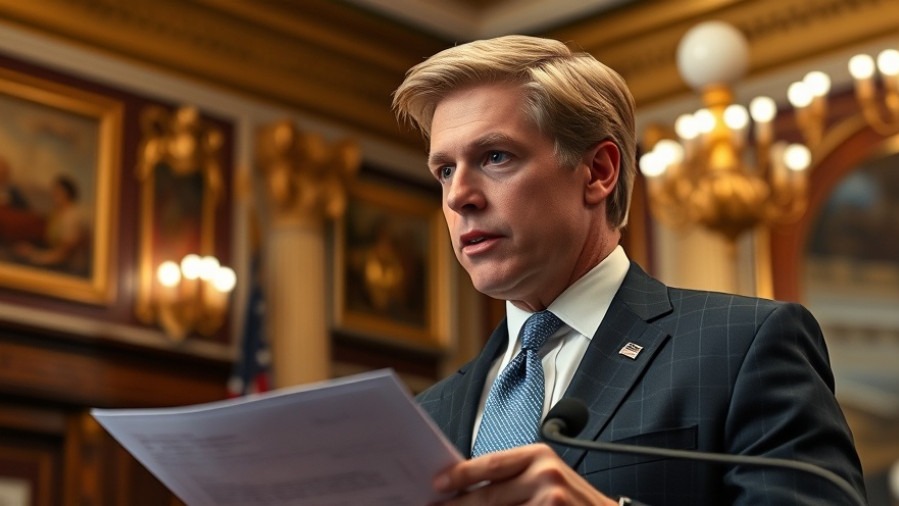
Understanding the Reaction: Why Trump's Ballroom Has Become a Controversial Topic
Rep. Eric Swalwell's recent demand that any 2028 Democratic presidential candidate must pledge to demolish President Donald Trump's planned ballroom has ignited a firestorm of reactions. Dubbed 'BDS' or 'Ballroom Derangement Syndrome' by some, this new political litmus test underscores the escalating tensions and divisions within both the Democratic Party and the broader American political landscape. As Swalwell's proclamation suggests, the ballroom—slated for construction at an estimated cost of $250 million to $300 million—has become more than just a physical space. It now represents the intense and often personal animosities that many feel toward Trump, reflecting how issues of space and luxury intersect sharply with political identity.
Swalwell's Bold Statement: Political Strategy or Genuine Outrage?
Swalwell's assertion, “Don’t even think of seeking the Democratic nomination for president unless you pledge to take a wrecking ball to the Trump Ballroom on DAY ONE,” is a clear example of political theater intended to galvanize supportive voices within the Democratic base. Given Trump's polarizing figure in American politics, Swalwell’s stance can be viewed as both a strategy to distinguish Democratic candidates and a rallying cry for anti-Trump sentiment. It contrasts sharply with more centrist voices in the party who may prioritize unity over divisive proclamations.
The Broader Implications of Trump’s Ballroom
At its core, the creation of a new ballroom highlights the ongoing debate surrounding Trump's legacy in the White House. Critics, including Sen. Amy Klobuchar, suggest that such opulence stands in stark contrast to the values of democracy itself. Klobuchar has referred to the demolition of portions of the East Wing as “taking a wrecking ball to our democracy,” indicating that the ballroom's construction could symbolize Trump’s perceived self-aggrandizement during his presidency.
In contrast to this critical sentiment, White House press secretary Karoline Leavitt argues that modernizations to the White House are an expected historical function of the presidency. She notes that prior presidents have also made significant renovations, although specific criticisms of Trump suggest that perceptions may vary depending on party lines.
Public Reaction: Divided Opinions on the Ballroom Project
The public's response reflects America's deep political divide. Supporters of Trump point to the ballroom as a necessary update, enhancing the capacity to host international dignitaries without resorting to the use of tented accommodations as seen during the Obama administration. Conversely, detractors argue that the project represents excessive spending during a time when many Americans face economic struggles.
While some affronted voters claim the ballroom symbolizes Trump’s extravagant leadership style, others view renovations as a simple matter of fulfilling the demands of a modern presidency. This debate suggests that constructions tied to individual leaders are more than bricks and mortar; they encapsulate the cultural tensions that result from leadership styles and public perceptions.
Potential Trouble Ahead: Implications for Future Democratic Candidates
As the lead-up to the 2028 election gears up, Swalwell’s litmus test adds a layer of complexity for Democrats trying to position themselves strategically within the party. Candidates may find themselves stuck between appealing to the more progressive elements of the party while also attracting moderates who may not resonate with such extreme statements. The pressure to react to Swalwell’s declaration raises concerns about whether Democrats can find a unified voice moving forward—especially when the party has been fraught with divisions since the last presidential election.
Conclusion: The Ongoing Polarization of American Politics
In the end, Eric Swalwell's call to demolish the Trump ballroom is a powerful indicator of how deeply entrenched political divides have become in the U.S. For local residents and businesses here in Kansas City, it might bear striking relevance. This ongoing conflict helps magnify the importance of understanding our own community’s positioning as the national conversation continues to evolve—dividing us into camps, affecting both political affiliation and local issues.
Have a story to share or want to contact us for more details? Drop us an email at team@kansascitythrive.com.
 Add Row
Add Row  Add
Add 




Write A Comment